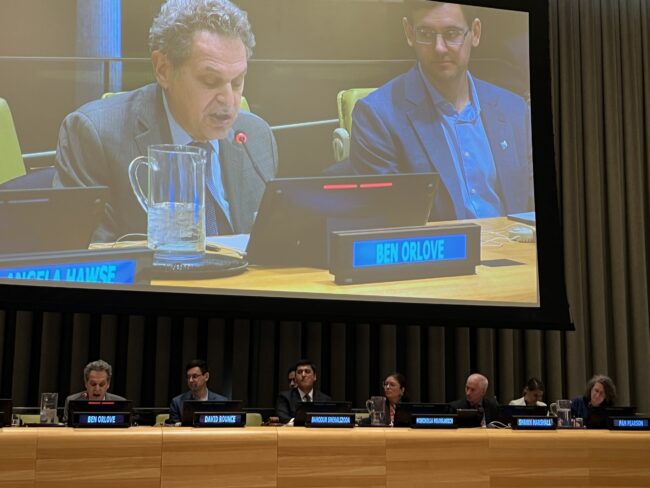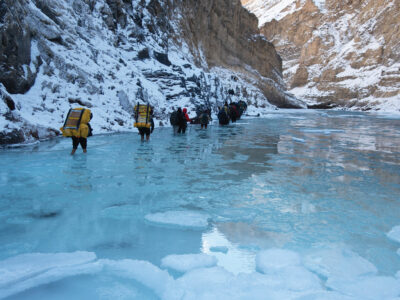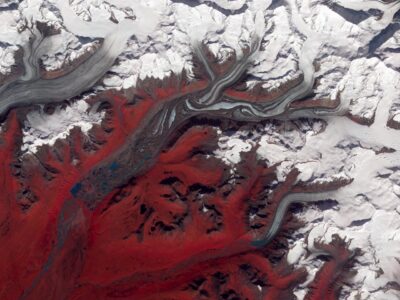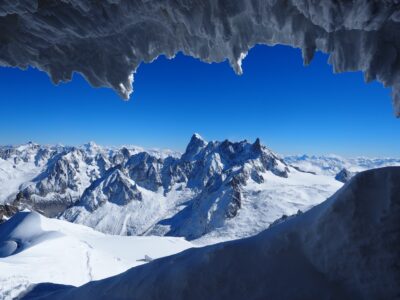Melting glaciers can have profound effects on nations all over the world—from mountain communities to small island states. At the U.N. headquarters in New York on Friday, March 21, U.N. General Assembly President Philémon Yang closed the proceedings of the inaugural World Glacier Day with a stark warning: “We cannot afford to wait, we must act before the ice disappears…before our glaciers all disappear.”

The event was held in the Trusteeship Council Chamber, a space used from the 1940s through the 1990s to oversee the decolonization of territories under the administration of the U.N. The location was symbolic, since the chamber has long been associated with international cooperation.
The proceedings began with a “high-level opening,” a term used in diplomatic circles to denote the introduction of an issue by a head of state or senior minister. In this case, the speaker was Sirojiddin Muhriddin, minister of foreign affairs of Tajikistan, who has worked closely with the U.N. for nearly two decades. His presence underscored Tajikistan’s deep commitment to collaborating with the U.N., particularly as a country reliant on glaciers for water supplies, to ensure their preservation for the future.
“[For Tajikistan] preserving glaciers…is a socioeconomic necessity,” said Bahodur Sheralizoda, chairman of the committee for environmental protection of the government of Tajikistan, at the event. Despite being a very low-emission country that derives over 90% of its energy from hydropower, Tajikistan faces significant challenges due to glacial melting caused by the burning of fossil fuels. Sheralizoda spoke about glacial lake outburst floods threatening bridges and roads, and more frequent drought impacting agriculture, energy production and industrial activities.
Following the opening statements, leading glaciologists and climate experts emphasized particular messages on glacier preservation. Shawn Marshall, a science advisor to the Canadian government, expressed concern about the accelerating rate of glacial melt: “Within the glaciology community, most of us are surprised by how quickly this is unfolding….The rate of glacier thinning is more than the warming.” One contributing factor he highlighted was glacial darkening. He explained that deposition of debris from wildfires has reduced the ability of glaciers to reflect sunlight, causing faster melting.

Ben Orlove, a senior research scientist at the Columbia Climate School and professor at Columbia’s School of International and Public Affairs (SIPA), emphasized the value of integrating Indigenous knowledge with scientific knowledge. “Scientific knowledge is rich and global in scale,” he said, “but it is often on a shallow time scale.” Indigenous knowledge is characterized by “ongoing monitoring of landscape” and “attentiveness to interaction with water, with vegetation, with soils,” he added. Orlove also discussed the complementarity of scientific and Indigenous knowledge systems, citing community-based projects in Peru and Nepal.

Angela Hawse, a mountain guide and environmental advocate, focused on the power of grassroots mobilization in driving climate action. She highlighted the work of Protect Our Winters, an organization dedicated to engaging outdoor enthusiasts and interest groups in lobbying for policy change. Hawse underscored the importance of effective communication strategies like stressing “the gravity of the situation and the potential loss of the things we love in the outdoors” to lobby for specific goals, such as public land protection and legislation that moves clean energy forward and addresses climate impacts.
Following the expert panel, representatives of U.N. member states delivered formal statements, outlining their national positions on the issue of glacier preservation. The representative of Barbados opened with an acknowledgement that while there are no glaciers, snow or ice on the tropical island of Barbados, “there is a connection between what is going in the glaciers and what is going on the coastlines of small island developing states like Barbados.” Pakistan referenced its event at the 2024 UNESCO headquarters in Paris, titled “Glacial Shift: Unveiling Pakistan’s Unique Climate Challenge.” This event focused on the Karakoram anomaly, the unusual phenomenon in which glaciers in the region are maintaining stable mass due to localized lower rising temperatures. The delegate argued that this further strengthens the need to limit the temperature rise.
Other attendees included Suzanne O’Connell, a geoscientist at Wesleyan University, who recently presented a report on the growing risks of glacial lake outburst floods to representatives of the insurance industry. Various NGOs were also present, such as Project Pressure, which has mapped three disappearing glaciers in Uganda. Their presence indicated an interest on the part of the World Meteorological Organization and the United Nations Education and Scientific Organization (UNESCO), the event’s lead organizers, in expanding glacial advocacy beyond the confines of the U.N.
In the meeting room, there were copies of the U.N. Water Development Report 2025 themed “Mountains and Glaciers: Water Towers.” The report, published by UNESCO on behalf of U.N.-Water, was publicly launched at the same time as the World Glacier Day. A key finding was that 60% of the world’s freshwater supply originates from “increasingly fragile mountain environments,” stressing the connection between glaciers and freshwater.
Following a brief pause, the World Glacier Day event transitioned to a discussion on sustainable water management for World Water Day. Since 1993, March 22 has been World Water Day, with each year introducing a different theme. This year’s theme was glacier preservation.
One key challenge, according to panelists for World Water Day, was how to manage international cooperation in the changing global order. Kaveh Madani, director of the U.N. University Institute for Water, Environment and Health, argued that “the main problem we are dealing with is uncertainty about the new world order.” This raises challenges such as “water governance,” especially given the loss of glaciers, “the world’s largest freshwater reservoirs.”
The representative from Russia insisted that “the water agenda…has to be looked through a development lens [and] not connect[ed] to the problem of peace and security.” Meanwhile, the U.N. Water Development Report emphasized the necessity of “multilateralism,” given that climate adaptation and water management are transnational issues. However, the question is: what does multilateralism look like in this context?
Through the U.N., “some small countries have punched well above their weight,” said Daniel Naujoks, director of the international organization and U.N. studies specialization at SIPA. Since the 1990s, small island states have pressed the world to acknowledge sea level as a crucial issue. Naujoks cited the leadership of Kiribati (a Pacific island nation) in climate governance as an example. Likewise, Tajikistan, a small mountainous nation, has achieved something similar with its steady promotion of World Glacier Day. Indeed, the day’s speakers spotlighted the interconnectedness of our world and its changing climate, as the melting glacial ice that affects mountain countries travels all the way to the ocean, leading to sea level rise that is felt by the island nations of Kiribati and Barbados.



